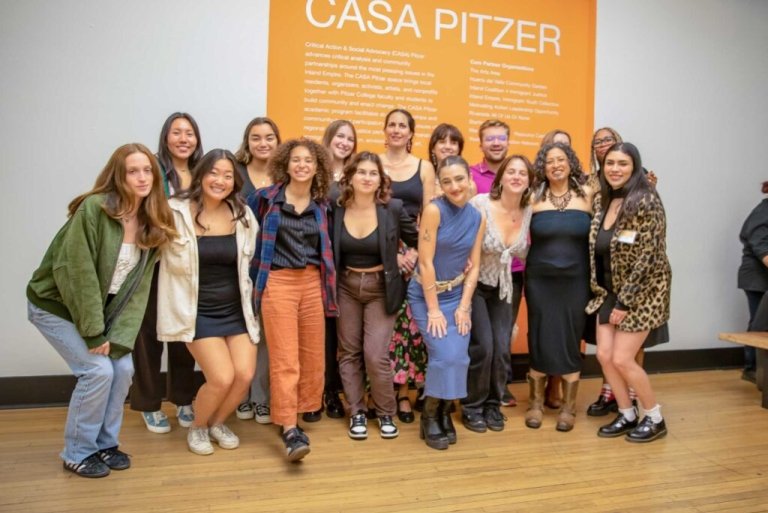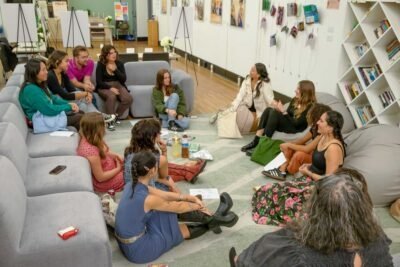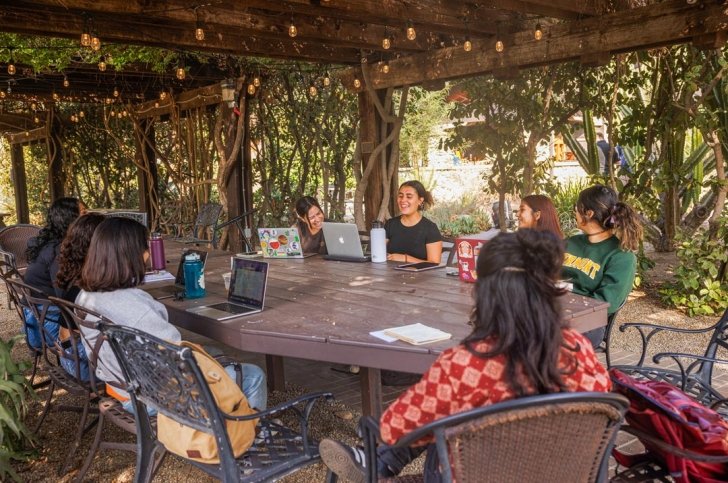CASA Pitzer Celebrates 25 Years of Community Activism in the Inland Empire
Critical Action & Social Advocacy (CASA) celebrates 25 years of justice-oriented learning and collaboration.

Critical Action & Social Advocacy (CASA) Pitzer has experienced many transformations during its 25 years of justice-oriented learning and collaboration. Today CASA Pitzer resides in downtown Ontario in the historic Frankish Building—where murals, natural light, diagonal bookshelves, and cozy furniture welcome everyone who comes in. It is here that activist research and community building become one.
Originally known as Pitzer in Ontario, CASA Pitzer advances critical analysis and community partnerships around issues in incarceration, immigration, indigeneity, education, environment, labor, art, culture, and health. CASA Pitzer brings local residents, organizers, activists, artists, and nonprofits together with Pitzer faculty and students to enact change.
Community-driven research and action
CASA Pitzer’s academic program, which are open to all students regardless of identity, background, or belief, includes two courses: Critical Community Studies and Research Methods for Community Change. The program facilitates student fellowships and community-based participatory action research with ten core community partners. Admission and course participation are based solely on academic interest, performance, and declared major.

“CASA Pitzer brings the theories to life by engaging what they look like in real time,” said CASA Pitzer Director Tessa Hicks Peterson. “We are navigating complexities that require rigorous study but also innovative solutions. To wrestle with how these issues impact different people is so different when you have relationships with them.”
CASA Pitzer has the same founders as the Community Engagement Center (CEC): Lourdes Arguelles, a former professor, and Alan P. Jones, emeritus professor and former dean of faculty. They established the program to offer students “academic structure and experiential opportunity to develop and practice local citizenship.”
While the CEC facilitates community engagement at large for the College, CASA Pitzer is a place-based, three-credit program that works with one cohort of 14 students every semester. Students take their classes in the community center and complete a 125-hour fellowship, which Hicks Peterson said “provides deep cultural immersion in the Inland Empire.”
“There are few places that have what we have, which is an off-campus community center that involves these longitudinal research projects for students to engage deeply and hands on,” said Hicks Peterson. “People all over the country come to see CASA and learn from the model.”
CASA Pitzer fulfills requirements for five different majors and three graduation requirements; it is deeply ingrained in the College’s educational mission. Students on financial aid can also count CASA Pitzer for work study.
Scholars in residence
CASA Pitzer also offers scholar-in-residence programs to cultivate more interaction between students, faculty, and community members. The CASA Community Scholar in Residence for professors is a key part of building CASA Pitzer’s teaching capacity.
As current CASA scholars, Professors Steffanie Guillermo and Jemma Lorenat are reimagining their work through community-based education and creating additional CASA classes. With community partners’ support, Guillermo is teaching a class about psychological bias in policing, and Lorenat is teaching data science ethics and justice. Both will return to teach CASA Pitzer’s main research methods course.
Hicks Peterson’s goal is for CASA Pitzer to encompass more organizations, majors, student cohorts, and faculty. CASA Pitzer is making great strides to that end. The teaching roster has expanded to include faculty in sociology, organizational studies, psychology, mathematics, and more. Hicks Peterson said that within the next few years, CASA Pitzer hopes to solely rely on full-time faculty instead of adjunct professors.
On the horizon
Another major goal is the cultivation of CASA Pitzer as a vibrant community center in its Ontario location. Multiple organizations use the space to host events for grassroots organizing, education, and the arts on a near daily basis.

Ribbon cutting ceremony in 2016 at CASA Ontario with Interim President Tom Poon, Mayor of Ontario Paul Leon, and Pitzer and Ontario community members
“There’s a greater sense of ownership for the community to know that Pitzer is a partner and that space is theirs, too,” said Hicks Peterson.
CASA Pitzer received an anonymous $250K donation last year to grow the community center and academic programming. Last fall, the San Manuel Band of Mission Indians gave a grant to Pitzer that includes support for CASA Pitzer’s three-year oral histories project in collaboration with Native and Indigenous communities. This summer, North Atlantic Book Press is publishing CASA Pitzer’s ongoing work in restorative and healing justice through the Know Justice, Know Peace initiative.
CASA Pitzer strives to pursue ethical, reciprocal relationships with local organizations and base students’ research on what those organizations want and need. Students come away with a burning passion to continue their on-the-ground work.
“CASA Pitzer is an experience that impacts people so deeply,” said Hicks Peterson. “Alumni from 15 years ago share about how it altered what they did in grad school, the career they chose, and how they engage today with their communities and families.”
News Information
Published
Organization
- Critical Action + Social Advocacy (CASA)


